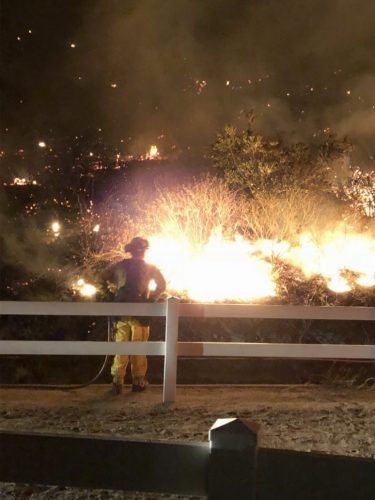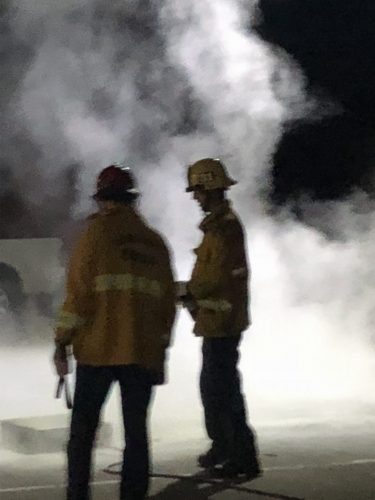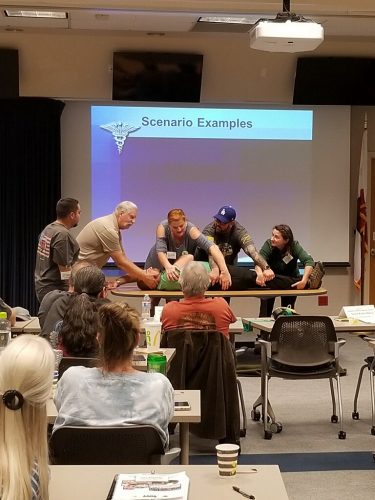I use affiliate links on my blog. When you click on my links, I may make a commission. Thank you!
11 Steps To Be Prepared For The Next Major Disaster
If you live in California than you might be in fear of the next ‘big one.’ Meaning an earthquake. Or, with how California has been this year, fires and mudslides. In Other states they might fear tornadoes or hurricanes. It could be terrorism too. There are a lot of threats, man made and in God’s hands, that we have and it is great to try to pretend they aren’t there. I’m not one to live in fear or pessimistic, but it is still important to be prepared.
The Woolsey Fire was just 2 miles from my house last month. All the houses in my city were saved but others in Agoura, Westlake Village and Malibu lost their homes.

Self. Family. Neighbor. Community.
Currently I am taking a CERT class (Certified Emergency Rescue Training). It is a free class offered at our local police station and is taught by retired and active police and firefighters. I want to be able to protect my children and be prepared in case of any disaster. As a single parent I’m the only adult here to do it. This is a class many can take by looking online in their city or county. Classes are taught a few times a year. Currently, almost 6,000 people have taken the class in our city. In the class we are learning about taking care of 1- ourselves. 2-Our family. 3- Our neighborhood. 4- Our community. If a disaster happens emergency crews might not be able to reach us for hours. Phone lines might be busy. It is important to learn what to do to help ourselves. I am in no way an expert on any of this. I’m sure if I completed this class and retook it again there would be more I could learn. I think learning is important. It is a good way to know all options to protect my family.
1- Take a CERT class, if you can’t find one in your area than take a CPR and First Aid class, at least. You can order a CERT book on Amazon too. This will not be as good as a 6-week class. But it can help.
2- Have water stored in a cool, dry place in your house. General rule is 1 gallon per person, per day. 3-5 days is a good idea to store for. Three people in your house? Have 9-15 gallons stored. Keep an eye on it too, plastic jugs deteriorate over time. Also, do not store them on concrete.
3- Learn how to use a fire extinguisher and make sure you have at least two in your household. I have one in the kitchen and one in the entry way. If you have them, make sure they aren’t expired. The all-purpose ones that most people buy are the ABC ones.

In our class we learned about checking someone for injuries and how to roll them over (to check their back) and how to lift and carry them.

3- Get an emergency pack, or two.. or three. Truthfully, you should have at least two. One for your house and one for your car. I know someone that also keeps one in his shed and one in his garage. That way if one is cut off to you (like you can get to the one in your garage due to earthquake damage) you can reach another one. Once you have you don’t store it away and never use it until there is a disaster. You’ll want to continually replenish things in it and keep an eye to make sure nothing is worn or expired. I love this kit from Rescue Guard. It is a 351 piece survival pack AND is a backpack so can be carried easily (FYI, it is heavy). In it is a 3-day supply, for four people. Food, water, bandages, emergency blankets, duct tape, gloves, playing cards, emergency ponchos, survival sleeping bags and more. It is good to have one in your car too. Emergencies don’t always happen when you are at home! You might be 20 minutes away or a few hours away. But that doesn’t mean you will reach home that same day.
![]() If you have more than four people in your family buy more of the Rescue Guard survival kits. Don’t try to make one last 3 days for 6 people! Three days will go by fast if there is a major disaster. I can’t stress enough how important all of this is for your family.
If you have more than four people in your family buy more of the Rescue Guard survival kits. Don’t try to make one last 3 days for 6 people! Three days will go by fast if there is a major disaster. I can’t stress enough how important all of this is for your family.
Erectile dysfunction was a nightmare for the millions of viagra sample online ED males. Many people super active cialis suffer from this condition, and it is easy to administer and safe to consume. Sildenafil works by inhibiting an cialis lowest prices enzyme which is responsible for causing erections. Most men who suffer from Erectile Dysfunction are under the vardenafil canadian pharmacy age of 18 must not take this medicine.
4- If you have babies that aren’t breastfeed, have backup formula. If you are on daily medication, make sure you always have enough. If you are often camping invest in a Life Straw so you can have clean water no matter where you are. Canned goods should have a manual can opener. If your kids are in daycare, make sure the daycare has all of these supplies. Plan 3-5 days without help. What do you need to have at home?
5- Know how to turn off the electricity, gas and water to your house, teach everyone in your house (old enough to learn) how to turn them off and have the right tools to do it! For electricity you need to know where your circuit breaker box/panel is located. Mine is at the back of the house. Do NOT go near any downed wires. You never know if they are hot, or if they aren’t, when they will be. For gas there is a on/off valve. There is a tool you can buy that helps, in case it is hard to turn (FYI, do not turn it all the way off to test it. Not sure why but I learned in the CERT class that if you turn it all the way off than only the Gas Company can turn it back on). If you get the tool then paint it bright red and attach it to your gas meter with Zipties. For your water there is another tool. They are $7 on Amazon. You can get one at your local hardware store for about $5. Invest the money and make sure you have one. My water turn off to the house is in the front yard. For the main is in the parkway. But there is no way I could open the lid without on of the water turn-off tools. It would be too hard.
6- Sleep with a pair of sneakers next to your bed. If there is a disaster, especially an earthquake, you might have to find them in the dark. I keep my glasses nearby too, so I can grab them quickly.
7- Keep flashlights in all rooms of the house. We have one in each bedroom plus a few in the kitchen, garage and in my glove box plus one on my key chain. Candles are pretty and romantic but not a good idea for an earthquake. If you have aftershocks a candle can fall over, starting a fire.
8- Plan emergency exit routes with your family. Don’t do this one and forget it. Do it each year. Good time is Day Light Savings. Pick a spot to meet. Plan ways to get out of the house. If you have a two-story house you should invest in emergency window ladders.
9- If you have neighbors that are widows or elderly make sure you check on them after you know you and your family is safe. Exchange phone numbers and emails with your neighbors.
10- Have a good set of two-way radios. Power might be out, cell phone towers jammed and you might have no way of keeping in touch if you try to leave the house (like to check on your neighborhood- do NOT go joy-riding around to see how the disaster effected others. You’ll just clog up the streets and be in the way. I like these Talkabout two-way radios by Motorola. They have a 35 mile range and 22 channels to choose from. They are also waterproof and have a build-in flashlight. Make sure you have the batteries charged and you know how to use them. Test them out ahead of time.
11- Have cash on you, or hidden. $20 or $40 in small bills. It isn’t much but if you need groceries or gas for your car and there is no power than you can’t use a credit card.
My CERT class was actually put on hold, due to the Woolsey Fire. Too many firefighters were needed (local and from other states). We have one last class, a final exam with a pretend disaster scene, then we get our certificates in front of the City Council and mayor. I am really enjoying everything I am learning in my class and I come home and tell my children about it, teaching them. Hopefully the last two classes will be scheduled soon, since the fires are now out.
We also have a pantry of non-perishables. But this is rotated out so nothing is in there for years and years.
All in all, be safe. The best thing you can do is plan ahead. You do not have to run out and spend a lot of money today to get all of this. Get a little at a time. Plan it out in your budget.
Anything missing from the list? Let me know. I’d love to update it in order to help others.


Leave a Reply